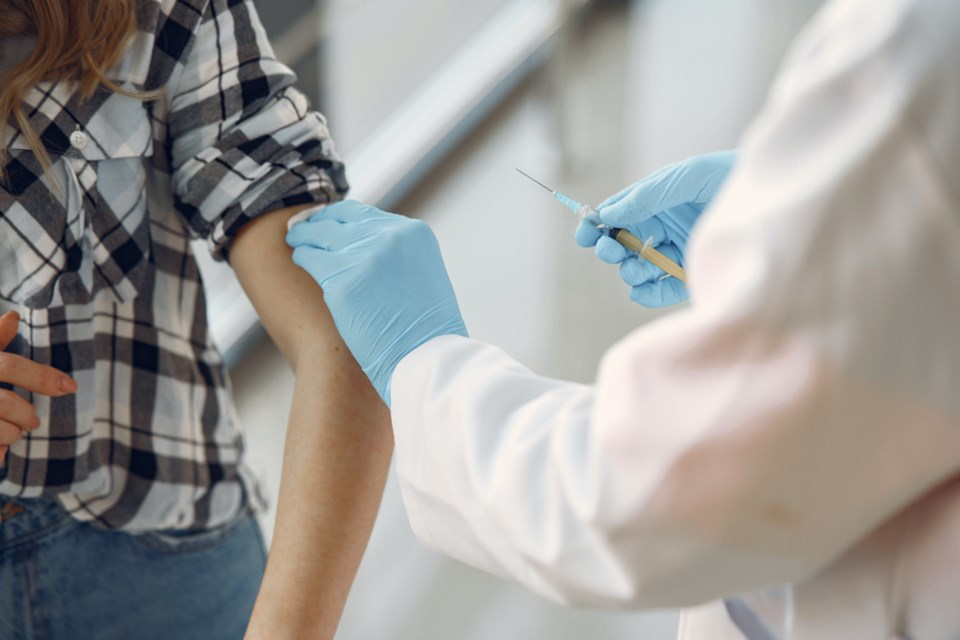As cases of the Omicron variant surge and Canadians race to secure COVID-19 booster shots, questions are being raised about how long it takes for third doses to become effective and what to do if someone contracts the virus before being able to get their jab. Here's what some health experts say:
Once you get your booster, how soon does it start to take effect?
With the first two doses of a COVID-19 vaccine, Ontario's top doctor said it takes 14 days for the shots to boost immunity. But with a booster dose, Dr. Kieran Moore said immunity against COVID-19 typically increases sooner.
"We know with the booster dose ... within five to seven days, you have a significant rise in your antibody production. And your memory cells are re-triggered against COVID," Moore said at a press briefing Tuesday.
"And it's good to remind everyone that very shortly after five to seven days after that third booster dose, you've got a good level of protection, back to your primary series level of protection against COVID."
Health Canada spokeswoman Tammy Jarbeau said because booster doses "stimulate the response to the vaccine that was already in place," it becomes effective a bit sooner than after the initial two-dose vaccination series — "somewhere around 10 to 12 days."
However, Jarbeau noted that "everyone’s response will be somewhat different, so 14 days is still a reasonable time period to be considered adequately protected after a booster dose."
Dr. Tasleem Nimjee, chief medical innovation officer for Humber River Hospital in Toronto, similarly said while the "added effect" of a booster may kick in earlier than the first two doses of a COVID-19 vaccine, that shouldn't mean that people should let their guard down.
"What I wouldn't want someone to do is go get the booster and think ‘perfect, I count seven days and that gets me to Boxing Day or that gets me to Christmas dinner.’ And they go out there and be a bit bolder than they should be," she said.
Does a booster shot provide protection against severe health outcomes?
Jarbeau, of Health Canada, said it's expected that being fully vaccinated and then getting an mRNA booster "will provide very good protection against severe disease."
However, she stressed that vaccines will not protect everyone from developing symptoms, so it is "very important to continue to use public health measures (like masking, maintaining physical distancing, and staying home if sick) even after receiving the booster dose."
What do you do if you start experiencing COVID-19 symptoms on the day of your booster appointment?
In the event that someone has symptoms of COVID-19 on the day of their booster appointment, they should stay home, said Dr. Michael Warner, clinical director of critical care at Michael Garron Hospital in Toronto.
"If you have symptoms of COVID, you're supposed to self-isolate. So you shouldn't be going to get a shot, you should be going to get a PCR test," he said.
"That being said, I think the testing capacity in Ontario will be overwhelmed so that people will probably be instructed just to self-isolate, even in lieu of getting tested, because we will exceed our capacity within days. And ... therein lies a significant challenge."
Given that some may get infected before their third-dose appointment, Warner said it would help if those appointments could then open up to others who need boosters.
"That's also important because it really is a race to get as many people that third shot as possible," he said.
If you get COVID-19, how long after contracting the virus should you wait to get your booster?
Moore said a 30-day time frame is "the typical recommendation" for how long people should wait to get a booster dose after they've been infected.
"That is most likely the best time immunologically to get the booster, (it) absolutely should be an mRNA vaccine at that time. It doesn't matter which one, they both are very effective and interchangeable," he said.
Dr. Fahad Razak, an internist and epidemiologist at St. Michael’s Hospital in Toronto, said for patients with underlying medical conditions, "it's best to also consult with your physician on ideal timing."
-- with files from Holly McKenzie-Sutter.
This report by The Canadian Press was first published Dec. 22, 2021.
---
This story was produced with the financial assistance of the Facebook and Canadian Press News Fellowship.
Liam Casey and Noushin Ziafati, The Canadian Press
